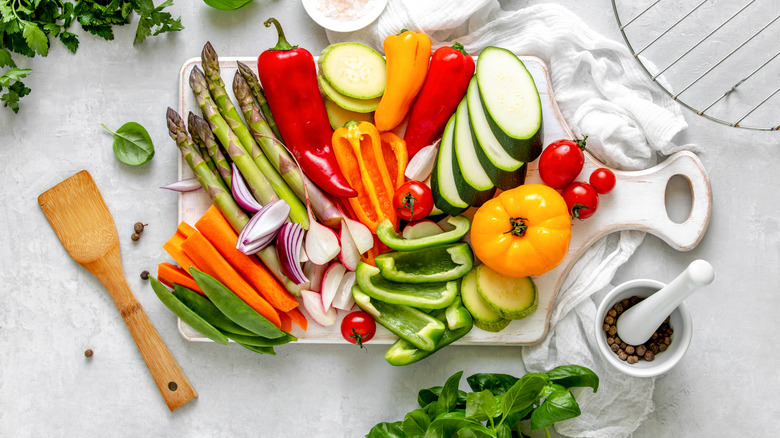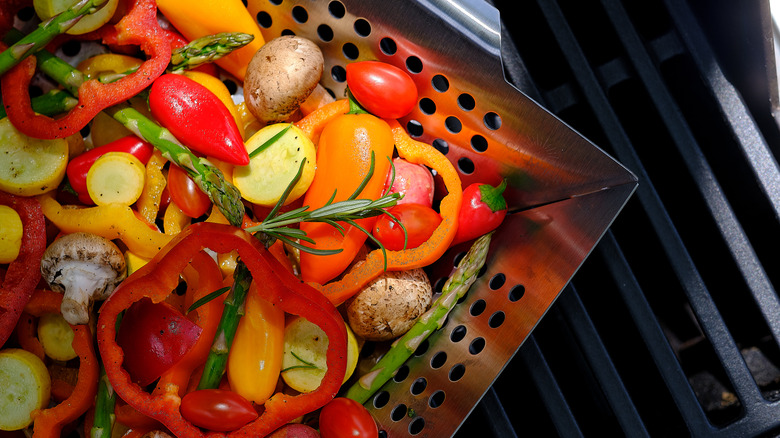How Bobby Flay Keeps Food From Falling Through The Grill Grates
As nimble as you may be with tongs and a spatula, there are some spindly vegetables and petite proteins that inevitably will always slip through the grill grates. Rather than testing your reflexes, we suggest following in the footsteps of celebrity chef Bobby Flay. The grilling expert recommends a simple solution to avoid lost food: Cut larger portions of vegetables and meat.
That's right, the answer is as simple as slicing produce into fat wedges or planks rather than dicing or cubing. Flay prefers to slice common grilling additions like eggplant and squash to about ¾-inch thickness, though you can adjust based on your taste. Just remember that thicker pieces cook slower and thinner pieces cook faster. You can also leave items like portobello mushrooms, carrots, and chicken breasts whole while they're over the flames and portion them after they're done.
As for things like shrimp and tomatoes, which can't help their unique shape, Flay prefers to anchor them together with wooden skewers. This helps them stay above the grates and actually makes it easier to maneuver the food. If you follow this tip, make sure to immerse your wood kebab skewers in water for a good soak before using. And once you place the sticks on the grill, leave them alone — too much fussing and moving will encourage your dinner to stick to the metal and come apart, making it even harder to transfer small items from the grate to the plate.
Tips for preparing ingredients for the grill
With the helpful tips of grill master Bobby Flay, you may feel ready to add even more wonderfully char-able vegetables to your dinner rotation. Before you light up your briquettes, however, you'll want to take the time to prep your components thoughtfully. Some foods benefit from extra finesse, while others are easier to cook when you take a "less is more" approach.
Zucchini and summer squash, for example, taste even better when halved lengthwise and scored (to do so, cut shallow, intersecting diagonal slices across the inside surface to create a crosshatch pattern). This allows more marinade and smoky flavor to penetrate the flesh, and it encourages excess water to release out for better texture. You can do the same with eggplant, too. Although this tip is not as regularly applied to peaches and other juicy fruits for the grill, we'd imagine crosshatching could have similar benefits and reduce sogginess in sweet ingredients as well.
As for any chopped vegetables and meats destined for skewers, though you might be tempted to load them onto the wood in a certain order or pattern for maximum visual and flavor effect, that could be a mistake. Rather, keep things simple and keep each kebab to a single item. In other words, load only peppers on one skewer and eggplant on another. This allows you to take fast-cooking foods off first and give slower produce more time on the grill, producing a better-tasting dinner.
Other grilling equipment to keep food from falling
If you're short on skewers or still have trouble tackling slippery foods that are best cooked whole, there's another household item that can prevent food from slipping through the cracks. Aluminum foil can reduce chaos (and mess) at the grill. For example, steam and char potatoes and beets by encasing them in foil, or lay a sheet across the grate before scattering broccoli or shucked oysters across the surface.
If you're interested in reusable equipment designed to keep small ingredients from falling through the grates of your grill, consider adding heat-resistant metal to your arsenal. Although chef Bobby Flay's tip for wood skewers is helpful and makes cooking for a crowd a breeze, there are some limitations. The sticks require a 30-minute soak and are intended for single use. Metal skewers, which are available in a variety of lengths, can take on mushrooms, onion rings, tofu, and even ground meat again and again.
Hands-off cooks may prefer a simpler solution, like a grill basket or a cast iron skillet to hold smaller proteins and veggies. You'll have less control over even browning — unless you flip each shrimp or green bean individually — and less direct contact with the flames, but the wide, flat surface of these heat-proof tools will allow you to skip the labor of loading up skewers. Flay occasionally uses a basket for grilled potatoes, so you'll have his stamp of approval on this move, too.



